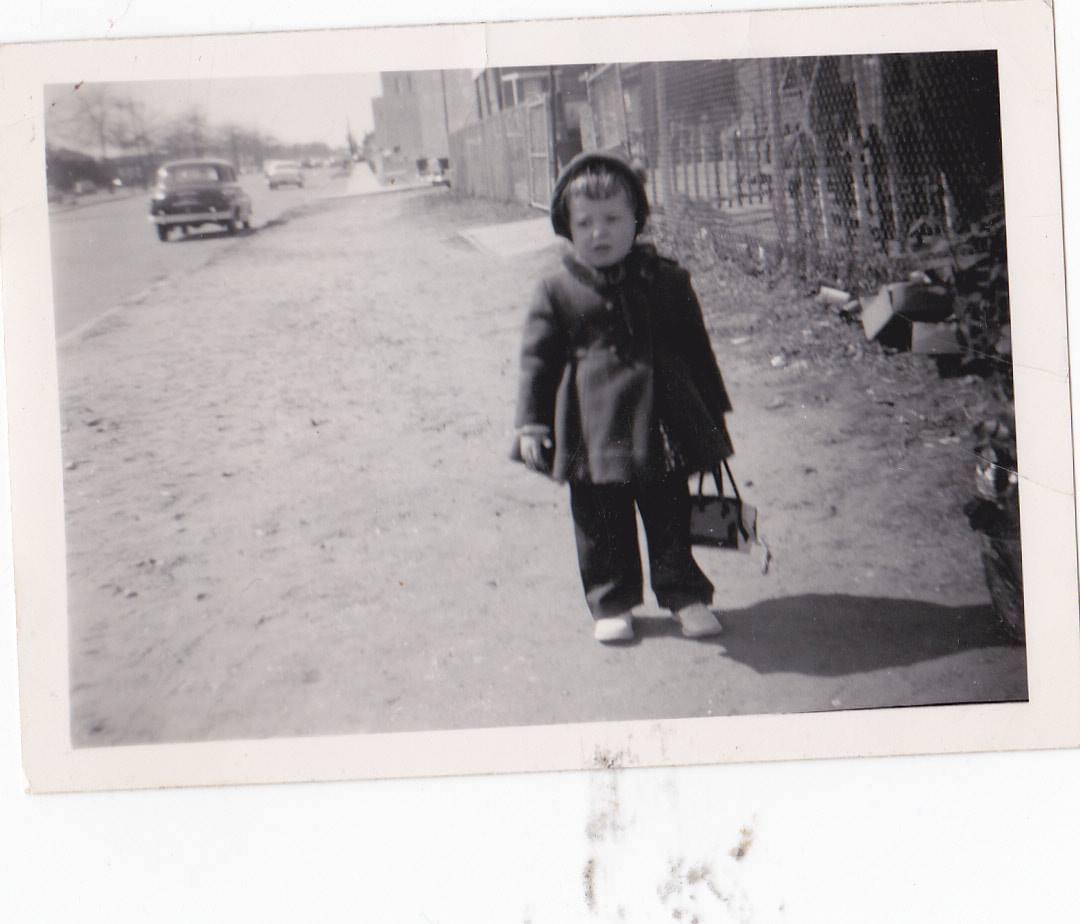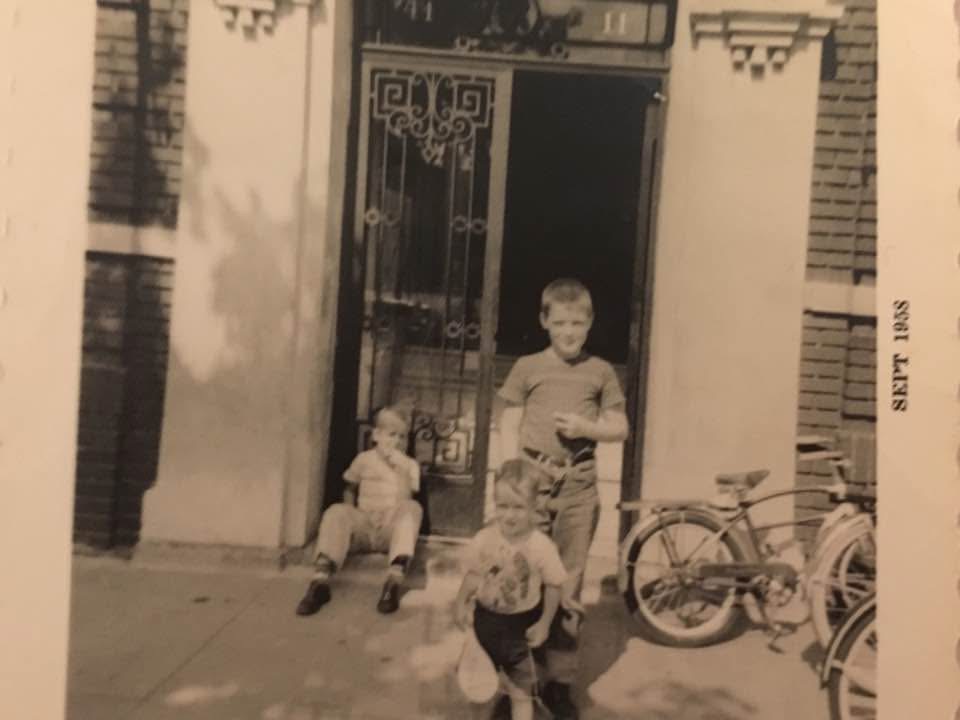Astoria: My childhood home
Debra White
The Cold War and the fear of communism dominated my youth in a scrappy section of New York City called Astoria. The USA was locked into a protracted cold war with the former USSR. To me, cold was shivering in our apartment because the cheapskate landlord forgot to order a shipment of coal. He did that sometimes.
To prepare for Armageddon, children practiced bomb drills at school by walking into hall closets. Now they prepare for mass shootings, but that’s for another story. I wondered if hiding among our coats and boots would’ve protected us from nuclear annihilation.
Shabby apartment buildings in my neighborhood lacked elevators but not roaches. They were never in short supply. Families large and small lived in cramped apartments minus air-conditioning. Sweltering summer heat could be brutal. Fans only swirled hot air around. For relief, we escaped to the fire escapes or sat on the front stoops.
All the action took place on the front stoop. Girls jumped rope and boys flipped baseball cards. Women sat outside, smoking cigarettes and gossiping. Men, many of whom were WW II veterans, shuffled outside in house slippers and traded war stories.
Girl Scouts and Boy Scouts were for the suburban kids, not us city brats. Spend the night outdoors and sing around the campfire? No way. There was also the fear factor. Who knew what lurked in the surrounding woods? Could be an axe murderer.
We were a lively bunch of kids, but violence was as foreign to us as fine dining. The term ‘at-risk’ hadn’t yet been coined. Out of boredom, we kicked cans around the back alleys and played stickball in the courtyards. The first time Richard, a local boy, belted a home run through Chickie Lady’s living room window the frantic old woman, whose real name was Alice Huckleberry, shooed us away with a broom. I don’t know why we called her Chickie Lady, but everyone did. Repairs cost Richard’s parents a bundle. By the next morning, our motley crew returned with stern warnings to bunt the ball instead of swinging away.
Monster, red light/green light, tag and hide-n-seek were popular games too. Climbing the brick walls separating the court yards was another past time. After a neighborhood boy broke his arm falling from a climb, mothers urged us to stay off the walls. We never did. Our simple escapades were too much fun. I scaled the wall with just two running leaps and then I was over.
Naturally big-mouthed children like me irked some neighbors, especially during the summer when we ran wild through the courtyards. With only a handful of public parks around and no access to summer camp, we claimed the alleys and courtyards as our own. We never saw ourselves as pesky, particularly to people without children. Nearly everyone in our neighborhood had children.
Drainage pipes sometimes clogged, spilling raw sewage into the courtyards. Waiting for repairmen to pump out the yucky mess closed our play areas. Instead of pouting, we rode our bikes around the neighborhood. Crime was rare. Not a single bike was ever stolen. Now and then, we shrugged off our parents and wandered away from the neighborhood to watch rats in garbage filled vacant lots. We were easy to please.
Owning a washing machine was a sign of upward mobility. Kitchens were too small, however, to accommodate dryers. Wet clothes dried on clotheslines strung between the buildings. Mother Nature took care of the rest. Unless neighbors had an attitude, sharing the lines was common. Not everyone had phones, so women gabbed while hanging out wash. Not many secrets were kept in my neighborhood.
Wintertime posed unique problems for laundry ladies because clothes froze on the line. Blue jeans turned rock solid. Once inside, heat from the radiators collapsed them into resembling real pants once again.
A family of slobs once lived above our apartment. Mrs. Marino hung out the wash in the spring and by the time the family moved out a year later, the wash, including Mr. Marino’s boxer shorts and argyle socks, lay in tatters on the line. The family also left behind a house full of cockroaches that had reproduced and spread out to visit the neighbors including my family.
Nearly all men worked in a factory. Blue collar jobs were plentiful. My father worked in a printing plant. Only Frank didn’t have a job. A disabled WW II vet, Frank was mostly deaf. If the weather cooperated, he sat on a lawn chair in front of his apartment building reading sports magazine and smoking cigarettes. Everyone knew and loved Frank.
Families struggled with one income. Public assistance was considered shameful. If a family qualified for benefits, no one dared to pay for groceries with food stamps. What would the neighbors think? Churches rarely had food pantries. The neighbors would’ve been too embarrassed to ask for help. Our worn-down community had stubborn pride.
Our landlord Mr. Rockstein drove in from Long Island on the first of the month to collect rent from tenants in his shabby buildings. Otherwise, we never saw him. If a tenant was late, he squeezed them until they paid, or he threatened immediate eviction. At the time, tenant protection laws were feeble. My mother always paid on time and in cash. We ate canned meats, but she kept Mr. Rockstein off our backs.
Vermin spread through the buildings because of the dumbwaiter, our trash disposal method. The dumbwaiter was a shaky, three-tiered wooden pulley in the hallway where tenants placed their trash. We were supposed to roll it down to the basement where presumably the superintendent, bleary-eyed Mr. Coughlin, when he wasn’t drunk, removed it daily and stuffed it into garbage cans in the alley. When Mr. Coughlin was hungover, which was most of the time, open bags of garbage sat on the dumbwaiter for days. As a result, roaches and mice found their way into our apartments. Mr. Coughlin seemed to always find the Red Door Inn, the bar around the corner.
Rockaway Beach, our escape for fun in the sun, was a long drive from our neighborhood. Since many families didn’t own cars, we resorted to tar beach, a city term for sunning on the rooftops. We would slather our bodies with suntan lotion then hike up the four flights to the roof with chips and soda. Tar beach wasn’t as much fun as a day at the shore with cool breezes skimming off the ocean or eating hot dogs smothered in onions and relish on the boardwalk, but it worked well to get a tan.
Despite financial hardships, families slapped on fresh coats of paint in their apartments every year. Floors were covered with new but cheap Linoleum. Women sat on windowsills to wash windows. For an added touch, housewives shopped for new curtains and bedspreads in local discount stores to add homey touches to our rundown buildings.
Some families faced challenges. Charlie Wilson was an only child. Almost everybody had at least one sibling, usually more. Charlie’s dad Otto raised him alone because his mother Ginny died when he was just a boy. She smoked herself to death.
Brian Kimble, another only child, might’ve been taken into foster care in today’s world. His father died when he was young. Overwhelmed by grief over her husband’s loss, Brian’s mother fell into a deep, prolonged depression. She rarely left the house. I’m not sure how they managed. Brian basically raised himself. Neighbors often invited Brian in for dinner. No one in those days sought mental health care, including his mother. That would’ve invited community scorn.
Despite leaky plumbing, crooked ceilings and flecks of paint hanging off the walls, nothing stopped the neighbors from their devotion to the Catholic church. Every Sunday hordes of families flocked to St. Joseph’s for one of about a dozen Masses. Overflow crowds sat in the balcony.
I dreaded Sunday. My mother dressed me like a doll in frilly dresses with crinoline slips that made me itch. Playing stickball or tag in the alleys with the neighborhood kids held more appeal. Sitting through a service said in Latin bored me, especially during the summer. The church lacked air-conditioning. On hot and humid days, I was miserable.
I almost stashed enough money away for a pack of baseball cards, which came with a generous serving of bubble gum. We kids collected then traded baseball cards. I only needed another dime. I kept the quarter my mother gave me that was intended for the collection basket. When we got home, she noticed the coin slip out of my pocket.
“That was for God,” she said.
“I didn’t think he’d mind,” I said. “I needed money for baseball cards. We’re having a big trading competition, and I want to be part.”
“That’s gambling.”
“What’s the big deal? You gamble for money. I gamble for baseball cards and bubble gum.”
“It’s different, I’m an adult. You’re a child.”
After whacking my hand, she took back the quarter. I waited until next week’s allowance to buy my next pack of baseball cards. I barely had enough baseball cards to enter the competition.
One day, I was out with my dad. He stopped at St. Joseph’s church and said, “Let’s go inside and pray for Uncle Nicky.” Dad’s only brother had lung cancer.
He glanced at my bare head and said, “What’ll I do about you?”
Catholic girls and women were required then to cover their heads when in church.
“I’ll wait outside so God won’t be mad.”
Dad whipped out his handkerchief.
I frowned. “Don’t put that on my head. It’s got boogers on it.”
“Be quiet and let’s go inside.
I sat squirming next to Dad, with his dirty handkerchief on my head, wondering my disease I might catch.
Plenty of families used our neighborhood as a steppingstone to better days. With enough money in the bank, families bought nice houses on suburban Long Island with picket fences and two-car garages. Sometimes they adopted dogs. Kids had yards to play in, pools to swim in. Families always said they’d come back to visit. They never did. My parents couldn’t afford the suburbs. I slept on the living room couch and ate frozen dinners.
For all its quirks, the neighborhood had its own beat. Tony’s Candy Store was my favorite hangout. Tony’s sold the daily newspapers, gobs of candy, the latest baseball cards, ice cream, plastic toys, rubber balls, and of course cigarettes. Whenever I had an extra nickel, I stuffed my face with cavity causing sweets. Among my top picks were two cent pretzels, chocolate egg creams, and bubble gum. I chewed so much gum my parents must’ve forked over a lot of money to keep my teeth intact. I was high on sugar for years.
Healthy diets were unheard of. My closest connection to fruit was cherry Kool-Aid and orange flavored Life Savers. If it wasn’t soda, pizza, White Castle burgers, hot dogs, cheese doodles, cookies, candy, donuts, Twinkies, Ring Dings, ice cream and a long line of other nauseating sweets, why bother? I rarely missed the Mister Softee ice cream truck when it cruised down our block. Only the lack of modern technology kept us slender. We spent hours outside at play, despite frigid winters and steamy summers. Back then, blackberry and apple were known only as fruits.
Growing up in New York City made me somewhat paranoid and suspicious. I never fell for a scam and doubt I ever will. You want me to give you, a stranger, money? For what? Go away.
I wouldn’t recognize today’s Astoria. Like most of NYC, rents are high. Current rents in my old building floored me. They are over $2,000 a month. We paid about $100 or so.
I loved growing up in the city. In 1989, I moved away but I love New York even if I’ll never live there again. Thanks for the memories.

